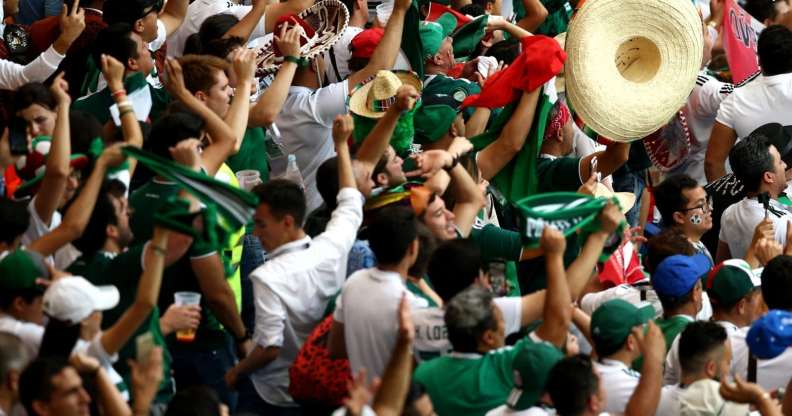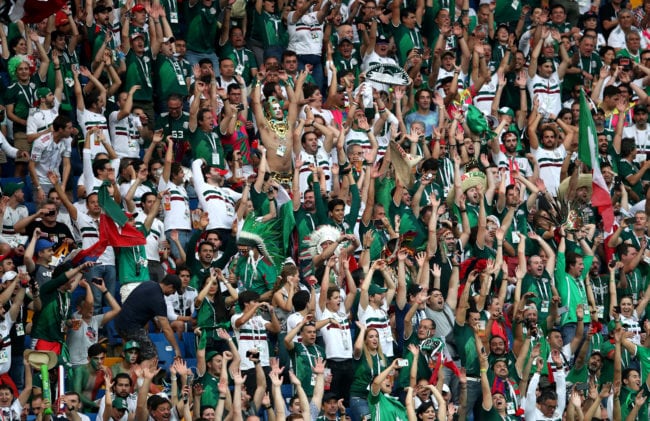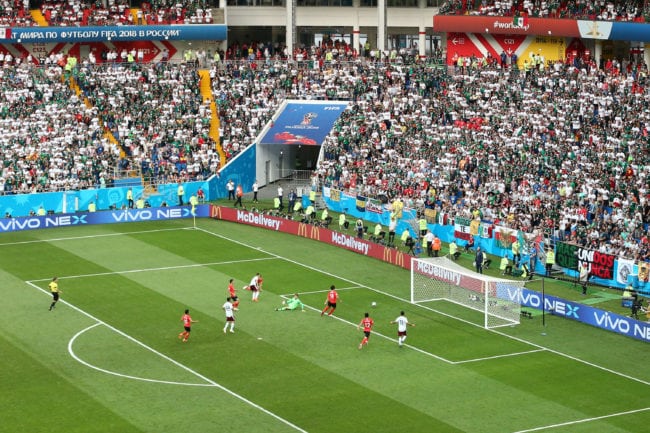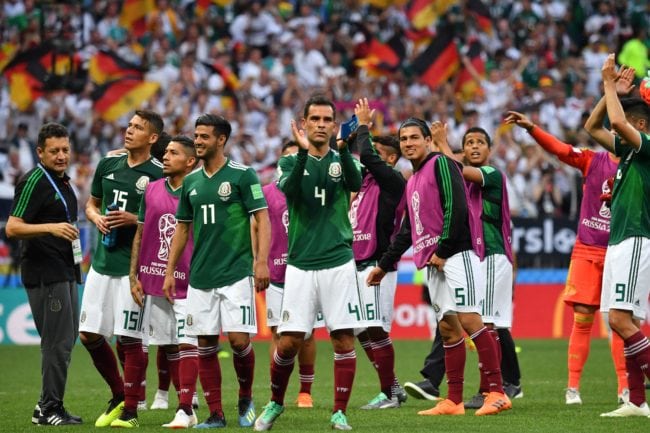Mexico fans refrain from homophobic chants at World Cup match after team’s pleas

Mexico fans celebrate (Jan Kruger/Getty)
Mexico fans refrained from using a homophobic slur at a World Cup match on Saturday, after pleas from players to stop the practise.
The country’s football team has faced repeated fines from FIFA over the use of anti-gay chanting at football matches, and has been sanctioned by the football authority on at least 12 occasions.
FIFA issued a fine this week after the homophobic chant “puto” – an anti-gay epithet equivalent to “faggot” or “male prostitute” – was used by Mexico fans at the team’s match against Germany last Sunday (June 17).
The “puto” ban has ignited controversy, as some footballers have attempted to argue that the word is not intended to be a homophobic chant – but Mexican LGBT groups insist that it constitutes anti-gay hate speech.

Mexico fans create a Mexican wave during the 2018 FIFA World Cup Russia group F match between Korea Republic and Mexico at Rostov Arena on June 23, 2018 in Rostov-on-Don, Russia. (Clive Brunskill/Getty)
But at Mexico’s second World Cup match against South Korea on Saturday (June 23), fans refrained from using the chant.
It came after public appeals from the team and several of its stars.
Mexico striker Javier Hernandez has urged the team’s fans to stop chanting at further matches, after FIFA threatened further action if the issue continues.
He said: “To all Mexican fans in the stadiums, don’t shout ‘pu–‘. Let’s not risk another sanction.”
After the game Mexico midfielder Andres Guardado thanked fans for the “very positive” step, though he also insisted that the term was not homophobic.
Guardado said: “In spite of those of us who are Mexicans knowing that it is not offensive and isn’t homophobic as FIFA see it, if there is a rule or something that bans it, it’s great that it has been respected in this game and hopefully it’ll continue during the World Cup.”
In a statement on Thursday, FIFA confirmed that it had issued a fine over the conduct at the Mexico v Germany match.

Javier Hernandez of Mexico celebrates with teammates after scoring his team’s second goal during the 2018 FIFA World Cup Russia group F match between Korea Republic and Mexico at Rostov Arena on June 23, 2018 in Rostov-on-Don, Russia. (Clive Mason/Getty)
It said: “The FIFA Disciplinary Committee has sanctioned the Mexican Football Federation with a fine of CHF 10,000 ($10,030 USD) for the misconduct of a group of Mexican fans in relation to discriminatory and insulting chants during the first half of the 2018 FIFA World Cup match played between Germany and Mexico.”
It cited article 67 of the FIFA Disciplinary Code, which states that the team can be found “liable for improper conduct among spectators.”
FIFA has previously issued fines to Argentina, Brazil and Mexico for homophobic chants by fans at qualifying matches for the 2018 World Cup.

Javier Hernandez of Mexico scores his team’s second goal during the 2018 FIFA World Cup Russia group F match between Korea Republic and Mexico at Rostov Arena on June 23, 2018 in Rostov-on-Don, Russia. (Jan Kruger/Getty)
However, the fines have been criticised for making little impact. Mexico has been fined no less than eight times over homophobic chanting with no real change.
The size of the fine is also smaller than that handed out to the English football association after players flouted rules to wear Armistice Day poppies.
Last year FIFA implemented a new procedure giving referees the authority to abandon matches if homophobic chants do not cease.

(FromL) Mexico’s defender Hector Moreno, Mexico’s goalkeeper Alfredo Talavera, Mexico’s forward Carlos Vela, Mexico’s midfielder Rafael Marquez and Mexico’s defender Erick Gutierrez celebrate their 1-0 victory at the end of the Russia 2018 World Cup (YURI CORTEZ/AFP/Getty)
Under the new procedure, referees will have the authority to pause the match, with a tannoy announcement warning fans against discriminatory language.
If it does not cease, the match can be suspended or even abandoned entirely.
However the procedure was not deployed at the Mexico v Germany match.

